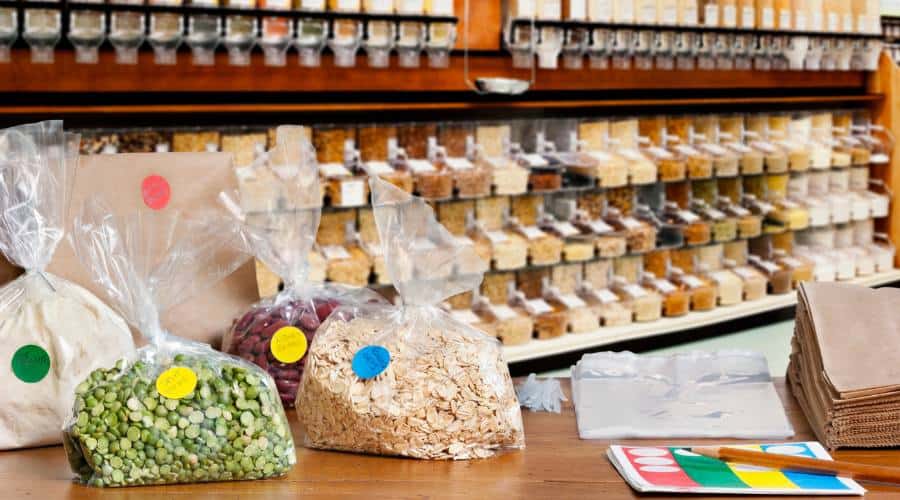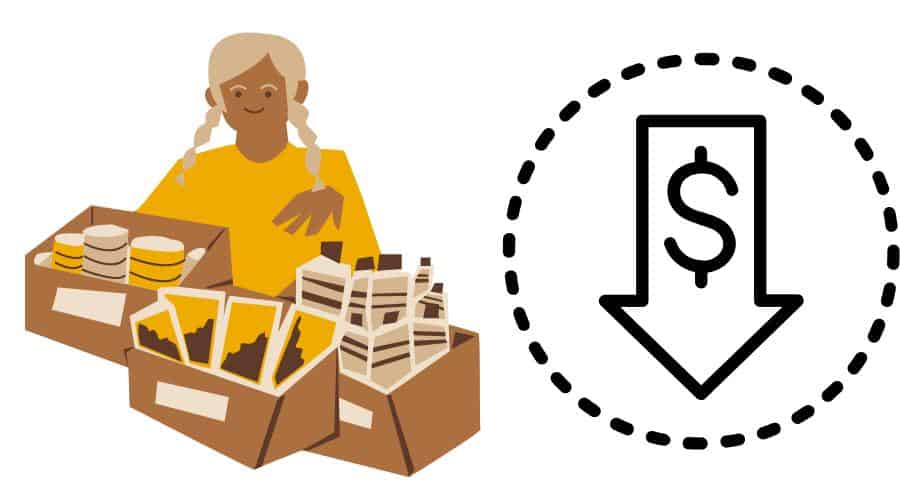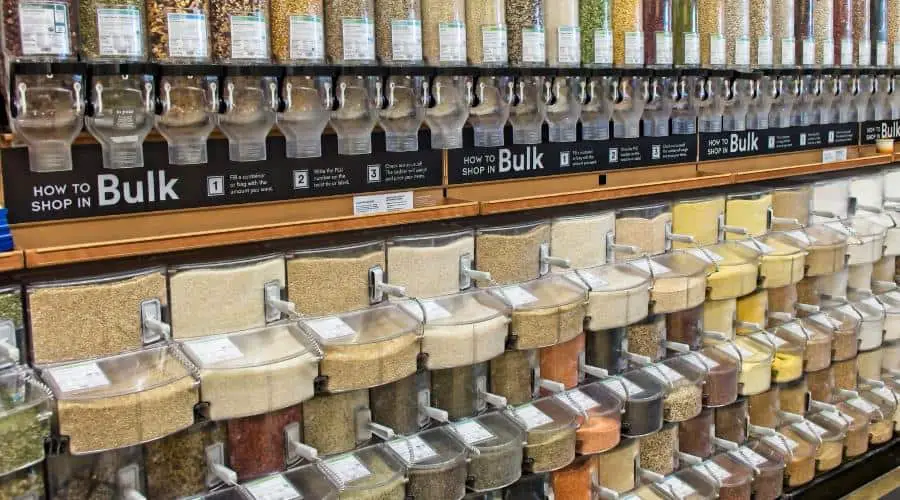My wife and I are always looking for the most cost-effective way to buy groceries and bulk foods to store in our food storage. Growing up my mom often bought food in bulk so I just assumed that buying food in bulk was generally cheaper. So I decided to look into the question, is buying food in bulk actually cheaper?
It is often cheaper to buy food or groceries in bulk because you are able to get a lower price per unit when you buy larger quantities. This is due to the economies of scale that come with bulk purchasing, as it can be more cost effective for the seller to produce and distribute larger quantities of a product.
If you’re looking to expand your bulk food storage make sure to check out the top 10 foods that are cheaper to buy in bulk and See 9 simple ways to save money on bulk foods.
However, it is important to keep in mind that even if it is cheaper per unit to buy in bulk it may not always be the most cost-effective option, as there are a few factors to consider when determining the overall cost of bulk food purchases:
- Storage: If you do not have enough space to store bulk food items, it may not be practical to purchase them in large quantities. This could lead to waste or the need to pay for additional storage, which could offset any potential savings. See tips on how to store bulk foods long-term.
- Quality: Some bulk food items may not be as fresh as their smaller counterparts, which could impact the overall quality and taste of the food.
- Expiration: Some food items have a shorter shelf life, so it is important to consider whether you will be able to use up the bulk quantity before it expires or spoils.
- Personal and family consumption: It is essential to consider your personal and family consumption habits when deciding whether to buy food in bulk. If you do not eat a lot of a particular food item, it may not be cost-effective to purchase it in large quantities.
Overall, it is a good idea to compare prices and consider your personal needs and consumption habits when deciding whether it is worth it for you to buy food in bulk.
We spent hours researching and trying these best places to buy bulk foods online at a discount and put together a locator tool to help you find over 400 Amish bulk food stores near you. Also, for those who don’t have time to compare groceries from different stores, we put together all the cheapest grocery stores here.
How much cheaper is it to buy food in bulk?
Buying food or groceries in bulk is almost always cheaper per unit, especially for non-perishable items that have a long shelf life. It is common for bulk food items to be 10 to 20 cents cheaper per unit or even bigger discounts can be found by savvy shoppers.
For perishable items, it is important to consider the expiration dates and how quickly the food will be used before making a bulk purchase.
There are a few factors that can affect the price of bulk food purchases:
- Quantity discounts: Many food suppliers offer quantity discounts for larger orders. These discounts can range from a few percentage points to 50% or more, depending on the supplier and the product.
- Shipping costs: Buying in bulk may also result in lower shipping costs, as the cost of shipping is often based on the weight or size of the package. However, it is important to factor in the cost of storing and handling larger quantities of food.
- Storage costs: Buying in bulk may require additional storage space, which can increase the overall cost of the purchase.
- Expiration dates: Some food items, such as dairy products and certain types of meat, have expiration dates that are relatively short. It is important to consider how quickly the food will be used before making a bulk purchase.
Overall, it is important to carefully consider the costs and benefits of buying food in bulk before making a decision.

Why are Bulk Purchases Cheaper?
Bulk purchases are often cheaper because they allow retailers to sell products at a lower unit price. This is because retailers can purchase items in larger quantities, which often results in a lower price per unit. They can then pass these savings on to customers by offering bulk purchases at a lower price.
Additionally, retailers may offer discounts on bulk purchases to encourage customers to buy more, as it can lead to increased sales and profits.
It’s important to note that not all bulk purchases will be cheaper than buying smaller quantities of a product. It’s always a good idea to compare prices and do your research before making a bulk purchase to ensure that you’re getting the best deal.
What Food is Cheaper to Buy in Bulk?
There are many types of food that are cheaper to buy in bulk, for a more detailed list see the top 10 foods that are cheaper to buy in bulk. Some bulk foods include:
- Non-perishable pantry staples: These include items like rice, beans, and pasta, which have a long shelf life and can be stored for a long time without going bad. See a full list of non-perishable foods with the longest shelf life.
- Grains: Grains like oats, quinoa, and wheat are often cheaper to buy in bulk. See how to store wheat berries and the best wheat/flour grinders for milling your own flour.
- Nuts and seeds: Buying nuts and seeds in bulk can save you money, especially if you use them frequently.
- Dried fruit: Dried fruit is often cheaper to buy in bulk, and it has a long shelf life, making it a convenient pantry staple. If you have bulk fresh fruit that you’re interested in preserving see the best food dehydrators and/or is buying a freeze dryer worth it for you?
- Frozen fruit and vegetables: Buying frozen fruit and vegetables in bulk can save you money, and they have a long shelf life, so you can stock up and use them as needed.
- Frozen meat: About every other year we buy half a beef cow and keep the various cuts (ground beef, different cuts of steak, roasts, brisket, etc.) of beef in our freezer.
- Emergency foods/meals: This includes freeze-dried meals and foods, as well as dried foods that have been packaged for easy cooking and consumption. See the best freeze-dried foods for any circumstance.
To help make it easier we spent hours putting together a list of our favorite foods for long-term storage.
It’s important to note that not all food will be cheaper to buy in bulk, so it’s always a good idea to compare prices and do your research before making a purchase.
Also remember that buying in bulk may not always be the most cost-effective or convenient option for everyone, as there are a few factors to consider, such as storage, quality, expiration, and personal consumption.
Pros and Cons of buying in Bulk
Some pros of buying food in bulk include cost savings, convenience, and long shelf life. However, there are also some cons to consider, such as the initial cost, the need for additional storage space, and the potential for waste if the food is not used before it expires. Overall, whether buying food in bulk is a good idea for you will depend on your specific circumstances and needs.
Benefits of Buying in Bulk
Pros:
- Cost savings: As mentioned earlier, buying in bulk can often result in cost savings because you are able to get a lower price per unit.
- Convenience: Buying in bulk can be more convenient because it reduces the need to make frequent trips to the store to restock up on essentials. This can save time and effort.
- Longer shelf life: Some food items, such as grains, nuts, and dried fruit, have a longer shelf life when purchased in bulk. This means they will last longer and reduce the need for frequent restocking.
- Reduced packaging: Buying in bulk can also help to reduce the amount of packaging used, which can be beneficial for the environment.
- Stockpiling: Buying in bulk can also allow you to build up a stockpile of certain items, which can be useful in the event of unexpected circumstances such as natural disasters or pandemics, when access to certain products may be limited.
Disadvantages of Buying in Bulk
Cons:
- Initial cost: The initial cost of buying in bulk can be high, especially if you’re buying a lot of a product that you’re not sure you’ll use up.
- Storage space: Buying in bulk can take up a lot of storage space, which can be an issue if you have limited space in your home.
- Waste: If you buy too much of a product, it could go to waste if you don’t use it before it expires. This can be a waste of money and resources.
Overall, it is important to carefully consider your storage capabilities and consumption rate before making a bulk purchase of any food item.
What foods should you not buy in bulk?
There are a few types of food that may not be suitable for bulk purchases, depending on your storage capabilities and consumption rate.
- Perishable items with short expiration dates: Foods that have a short shelf life, such as dairy products and certain types of meat, may not be suitable for bulk purchases because they may expire before they can be used.
- Foods that require special storage: Some foods, such as certain types of produce and baked goods, may require special storage conditions (e.g., refrigeration or freezing) to maintain their quality. If you do not have the necessary storage facilities or the ability to use the food quickly, it may not be practical to buy these items in bulk.
- Foods that you do not like or will not eat: It is important to only buy foods that you and your family enjoy eating. Otherwise, you may end up wasting food that you did not end up using.
Overall, it is important to carefully consider your storage capabilities and consumption rate before making a bulk purchase of any food item.

How Can You Save Money on Bulk Food?
There are a few ways you can save money on bulk food:
- Shop around: Compare prices at different stores to find the best deal on bulk food items. Don’t forget to also check online retailers, as they may offer competitive prices. See a list of the best places to buy bulk food online at a discount.
- Buy in season: Fresh produce is often cheaper when it is in season, so consider buying in bulk during these times. You can then preserve your fresh produce by freeze-drying, dehydrating, freezing, canning, and other methods.
- Look for sales and discounts: Keep an eye out for sales and discounts on bulk food items, as they can offer significant savings.
- Consider buying from a bulk store: Some stores, such as bulk food stores and warehouse clubs, offer bulk food items at discounted prices.
- Buy only what you need and will use: Don’t buy more than you can realistically use before it expires. This will help prevent waste and save you money in the long run.
- Plan meals and make a list: Before you go shopping, plan your meals and make a list of the bulk food items you need. This will help you stay focused and avoid buying more than you need.
- Use coupons and loyalty programs: Look for coupons and take advantage of loyalty programs, as these can help you save money on bulk food purchases.
By following these tips, you can save money on bulk food purchases while still getting the convenience and cost savings that bulk buying can offer.
If buying food in bulk makes sense for you and your family make sure to check out our food storage calculator to help estimate how much food you should have stored for yourself and your family.

